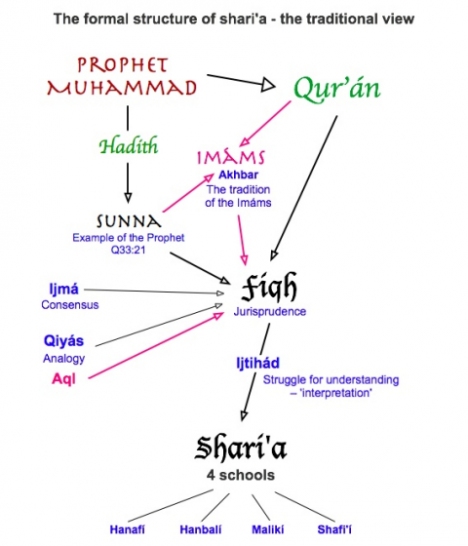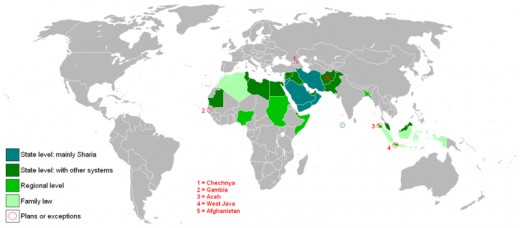What are Islamic Sharia Laws? - Sources of Islamic Law – Islamic Jurisprudence
The
root of the word 'Sharia' is Shara’a ; and some other names of it are Shar ,
Shari’ah, Shir’ah and Tashri . In Islam the total and unqualified submission to
the will of Allah (God) is the fundamental tenet. Islamic Sharia laws and Islamic jurisprudence are therefore the
expression of Allah’s command for Muslim society and in application,
constitutes a system of duties that are must upon a Muslim by virtue of his
religious belief. Known as the Shari’ah (literally, “the path leading to the
watering place” ), the law constitutes a divinely ordained path of conduct that
guides the Muslim toward a practically expression of his religious conviction
in this world and the goal of divine favour in the world to come.This hub is aimed to illustrate the sources of this divinely Islamic law.
Sharia deals with many issues of day-to-day life, including politics, economics, banking, business, family, sexuality, hygiene etc.

Sources of Islamic Law
Islamic doctrine, law and thinking in general are based upon four sources or fundamental principles:
Quran:
The Quran is the fundamental source of Islamic law and teaching (literally, reading or Recitation) is the Word or Speech, of God delivered to Prophet Muhammad (S.A.W) by the angel Gabriel. Divided into 114 surahs (chapters) of unequal length, it is the fundamental source of Islamic teachings. The surahs revealed at Mecca during the earliest part of Prophet Muhammad’s career are concerned with ethical and spiritual teachings and are about the Day of Judgement. While the surahs revealed at Medina at a later period in the life of Prophet are concerned with social legislation and the political and moral principles for constituting and ordering the community.
Sunnah:
The second source is Sunnah. Many verses of the Holy Quran deal with questions of law but not all the injunctions of the Shari’ah are clearly stated in it. There are many statements which needed further explanations before they could become guides for human actions. This explanations and clarification was provided by the Holy Prophet (PBUH ) who himself participated in the formation of the Shari’ah.
When the Islamic commonwealth was founded in Madina in 622 A.D. , the Holy Prophet (Peace be upon him ) was not only the spiritual leader but also the supreme judge of the Islamic community. A number of cases would be referred by his followers to the Prophet for his judgement. The underlying principle was that the word of Allah was in the Quran but if the Quran was silent, or needed interpretation, the Prophet as the messenger of Allah would be the authority for reaching a decision.
Ijma (“consensus” ):
Ijma is the third source of Islamic law. Literally, ijma means agreeing upon or uniting in opinion. It is the consensus of the Islamic community on some point of law. It can operate only where the Quran and the Hadith have not clarified a certain aspect of the law.
Qiyas (“individual thought” ):
Qiyas is the forth source of Islamic law which literally means “judging or comparing with a thing”. Qiyas means essentially to use human reasoning to compare an existing situation with one for which legislation already exists. If the Quran banned wine, it means that by reasoning, it has also banned all forms of alcoholic drinks, whose effect is like wine or something that causes intoxication.
Fiqh – The Islamic Jurisprudence
The meaning of the word fiqh is understanding, comprehension, knowledge and jurisprudence in islam. A jurist is called a faqih who is an expert in Islamic legal matters. A Faqih is to pass verdicts within the rules of the Islamic law namely Shari’ah. The most famous scholars of fiqh in the history of Muslims are the founders of the four schools of thought in Islam:
- Imam Malik
- Imam Ash-Shafi’i
- Imam Abu hanifah
- Imam Ahmad
Everything in Islam falls within the following five categories of Fiqh:
Fardh (Must): This category is a must for the Muslim to do such as the five daily prayers. Doing the Fardh counts is a good deed, and not doing it is considered a bad deed or a sin. It is also called Wajib except for Imam Abu Hanifah who makes Wajib a separate category between Fardh and the Mubah.
Mandub (Recommended): This category is recommended for the Muslim to do such as extra prayers after Zohar and Maghrib. Doing the Mandub counts is a good deed and not doing it does not counts as a bad deed or a sin.
Mubah (Allowed): This category is left undecided and left for the person, such as eating apples or oranges. Doing or not doing the Mubah does not count as a good or bad deed. Intention of the person can change Mubah to Fardh, Mandub, Makruh or Haram. Other things could also change the status of the Mubah. For example, any Mubah becomes Haram if it is proven harmful and any necessary thing to fulfil a Fardh is also a Fardh.
Makruh (Hated): This category is a detested and hated such as growing fingernails or sleeping on the stomach. Not doing the Makruh counts as a good deed but doing it does not counts as a bad deed.
Haram (Prohibited): This category is prohibited for the Muslim to do, such as stealing and lying. Doing the Haram counts as a bad deed and not doing it counts as a good deed.
Imam Abu Hanifah also puts another category between the Makruh and the Haram. It is called Karahah Tahrimiyyah which means hated almost to the level of Haram.
Formal Structure of Sharia

Countries with Sharia Rule

Books on Islamic Sharia Laws
Check Out Some Other Hubs By Valeed
- Quran Facts
The Holy Quran is the religious text of Islam , which was revealed by Allah to Prophet Muhammad. It is widely regarded as the finest piece of literature in the Arabic language . Muslims believe that... - What is Jihad in Islam ?
The literal meaning of the word ' Jihad' is struggle or strive . It's an Arabic word that has been mentioned numorous times in Quran (The Holy Book of Muslims ). Being considered the religious duty of all... - Do arguments ever settle anything???
There is a story told of the six blind men who went to see an elephant. Since they were blind, they could not see the whole elephant. Each felt a part of the elephant and each interpreted that the...









